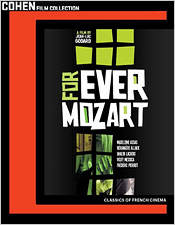For Ever Mozart (Blu-ray Review)

Director
Jean-Luc GodardRelease Date(s)
1996 (January 7, 2014)Studio(s)
Cohen Film Collection- Film/Program Grade: B
- Video Grade: A
- Audio Grade: B+
- Extras Grade: B+
Review
Jean-Luc Godard is one of the most influential filmmakers to come out of the French New Wave era of filmmaking. It’s amazing that he’s still around to make more films, much to the benefit of cinema, specifically, art-house cinema. His films are known for being mostly disjointed and left open to interpretation. In other words, they’re not meant to be seen by common movie-going audiences. They’re far too cerebral for your regular Joe. A very good example of this can be found in his 1996 film For Ever Mozart.
This film’s title, which is a French bilingual pun, is just the tip of the iceberg when it comes to how complicated Godard’s work is. It’s usually scattered all over the place with little to no narrative and contains a series of situations and images overlaid with interrupted soundtracks. It’s all just one large form of expression. The answers aren’t just handed over to you and it’s ultimately up to you as to what to make out of all of it. While the film showcases war briefly, specifically the Bosnian conflict of the early 90’s, it also features extensive ruminations on acting and filmmaking, as well as philosophy (quite often having not much to do with the scenes at hand). But there’s artistry at work, and you know it while you’re watching it.
There’s no doubt that his work is beautiful to look at though. The cinematography in For Ever Mozart is some of the best that you’re likely to find. The images really draw you into the film and not necessarily the story or the plot, because as such, there isn’t one. It’s basically Jean-Luc Godard ruminating on any given number of subjects, but not quite handing out all of the details. You just have to draw your own conclusions and make up your own mind about what it all means, and like any good work of art, different people have different meanings. It can be very confusing or frustrating if you’re not accustomed to Godard’s style, but if you are, then there’s plenty to chew over.
The Cohen Film Collection release of the film features a very a strong and film-like transfer. The film was shot with a 1.33:1 ratio, and is presented with black bars on each side of the screen. Film grain is very solid and unobtrusive throughout, and there’s plenty of depth to the images. Color reproduction is excellent, albeit with a muted palette, so the colors never quite pop, but it’s all by design. Blacks are very deep as well, and both the contrast and brightness are at acceptable levels. And I didn’t notice any compression artifacts, digital tinkering or any other discrepancies. It’s a very solid and pleasing transfer. For the film’s soundtrack, a single French 2.0 LPCM track has been utilized. It’s a stereo track that has a lot of depth to it without being totally amazing. Dialogue (although overlapping at times) is very clear, and both sound effects and score have a real boost to them. While it does have some dynamic range to it, don’t expect anything incredible. The film is mostly dialogue-driven and the soundtrack reflects that. Still, it’s a good track. And the subtitles in English that have been included were easy to follow along with.
The disc’s extras include an audio commentary by senior programmer for TIFF Cinematheque and Film Critic James Quandt; four featurettes (JLG/JCS: A Conversation with Jean-Claude Sussfeld, JLG/FM: A Conversation with François Musy, JLG/WK: A Conversation with Willy Kurant and JLG/ADB: A Conversation with Antoine de Baecque); the film’s 2013 re-release trailer; and an 18-page insert booklet featuring an essay on the film by Fergus Daly and an interview with Jean-Luc Godard by Hal Hartley. Not a whole lot to dig through, but enough if you’re interested in the film at all.
I wouldn’t consider For Ever Mozart Godard’s best film (I think most will agree that that title belongs to Breathless), but it’s still a worthy piece of cinema and worth your attention if you’re a fan of art-house cinema. And the Cohen Film Collection’s release of the film is certainly one to sit up and take notice of.
- Tim Salmons

